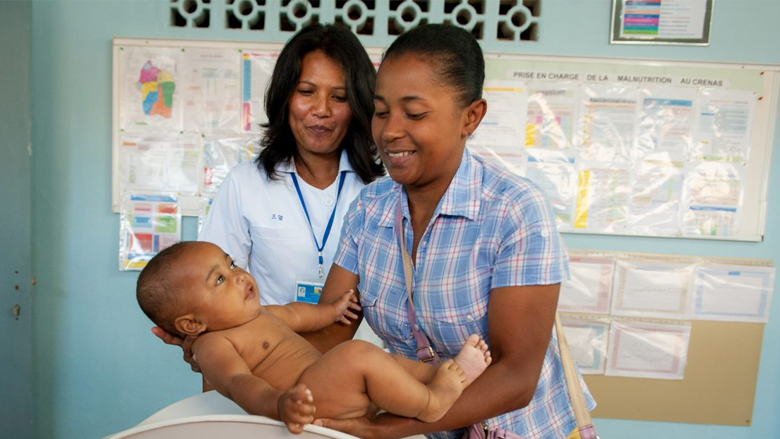In 2018, Madagascar had one of the highest rates of stunting in the world. Linked to insufficient healthcare, inadequate nutrition, and poor water and sanitation, stunting is considered one of the biggest impediments to children reaching their potential. Combatting stunting is also important for a country’s successful socio-economic development. With stunting rates as high as 50-60 percent in some regions, and 42 percent of all Malagasy children affected, it was imperative that the government do something to reverse these trends.
Global evidence has shown that a package of high-impact interventions can effectively reduce stunting. The IDA-supported Madagascar Multiphase Programmatic Approach (MPA) focused on reducing fragmentation and increasing coordination of nutrition and health services while building systems to sustain outcomes in the longer term. In partnership with the United Nations Children’s Fund (UNICEF), the World Health Organization (WHO), the Global Fund to Fight AIDS, Tuberculosis and Malaria, and GAVI - the Vaccine Alliance, the program developed new approaches to improve the competencies of service providers and quality of services.
The health and nutrition sectors jointly developed the first standardized package of integrated nutrition and health services and an associated training curriculum. Nearly 7,000 health workers were trained using this new approach and more than 3,000 integrated health and nutrition community sites were established. An additional 465 primary health care facilities were strengthened with necessary nutrition and health commodities and equipment to deliver the new standardized package.
At a health center in a rural village in Itasy province, the program trained health workers on health and nutrition services and provided equipment and key commodities. A fee exemption scheme ensured that key maternal and child services were provided for free.
Dina, a mother of a newborn infant, explained: “They monitored my weight from the start of my pregnancy. And they advised me on healthy foods to eat. I came here regularly to have good health, to have normal weight for my baby, and to avoid complications during childbirth. My baby was very heavy, not like my other two babies. The first weighed 2.8 kilograms and the second one 2.6 kg. He weighed 3.5 kg.”
The program has already reached more than 680,000 women and children with the reproductive, maternal and child health approach, and nutrition package and as many as 150,000 children have been fully vaccinated. Through the ten-year approach, the program will ultimately reach 75 percent of all children in Madagascar, ensuring that their future is healthier, happier, and free of the adverse impacts of stunting.

